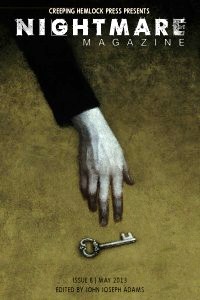 Nightmare #8, May 2013
Nightmare #8, May 2013
“Centipede Heartbeat” by Caspian Gray
“Doll Re Me” by Tanith Lee
Reviewed by Matthew Nadelhaft
Reading and reviewing Nightmare has been a new experience for me, but if this month is a typical one for the relatively new periodical, it’s an experience I’ll want to repeat. Nightmare publishes two original stories monthly; this month’s issue features stories by Caspian Gray and Tanith Lee.
Caspian Gray’s “Centipede Hearbeat” is a creepy and evocative story about a woman obsessed with the centipedes that have invaded her flat. Lisa is convinced that her live-in, the somewhat improbably named Joette, is possessed by the creatures. While the premise is not particularly exciting or original, it’s played quite skillfully. Gray’s strong writing and adept characterization make this a far more effective piece of terror than it would have been in the hands of a less talented and thoughtful writer. The key to the story’s success is Gray’s willingness to abandon the obvious horror of the premise, the countless creepy crawlies, to pursue the psychological horror of its consequences. The interesting and frightening question implicit in this concept – the one Gray asks – is not “how have these centipedes possessed Joette?” or even “what do they intend to do?” but “how far will Lisa go to save Joette?”
As Lisa experiments with poisons and insecticides, inevitably putting Joette’s life at risk, the deeper question becomes unavoidable: What is real? The possibility that Lisa is simply crazy is far more frightening than even what Lisa may or may not be imagining, because it is plausible. Binding the narrative closely to Lisa’s point of view makes the story doubly effective, keeping the reader constantly off-guard, without any stable reference points to aid interpretation. The only weak points in this story are its occasional lurches out of Lisa’s point-of-view, for instance in the unnecessary encyclopaedic inserts about centipedes. These diversions, being authoritative in tone and structure, subvert the problem of the unreliable narrator, which is the true strength of the story.
Tanith Lee’s “Doll Re Me,” while neither as disturbing nor as frightening a story, is, as one would expect, a sensuous, atmospheric tale. Lee’s lush, gothic prose builds a persuasive picture of a decadent future society in which the young maestro Folscyvio entertains literal masses with classical extravaganzas culminating in mysterious sacrifices. Folscyvio buys a new instrument, an enigmatic variation of a violin shaped like a mermaid, and obsessively works to master it for an upcoming performance. The relationship between Folscyvio and his new instrument, the “doll-mermaid-violin,” is a relationship of gendered violence. Cruel and domineering, Folscyvio approaches this instrument the way he approaches women, and with the same goal: domination and ultimately destruction.
Folscyvio is quite a nasty piece of work, and perhaps the story’s greatest weakness is in his one-dimensionality. He has no redeeming qualities, not even his talent, for Lee takes pains to point out that his virtuosity is, rather predictably, passionless. He is the heartless genius, all flash and little substance. His great ability is but a by-product of his need to possess and control. Interestingly, Lee – whether intentionally or not – recreates Nietzsche’s reasoning about art arising from will-to-power, which is the compulsion to master and control reality. That, for Folscyvio, this desire ultimately leads to his downfall is both satisfying and not so much poetic justice as structural necessity. Nor is giving away that ending in any way a disservice to the story; it’s clear from the outset that the story not only will but must end with Folscyvio’s downfall. In that, and other, regards, neither Tanith Lee nor Nightmare disappoints.